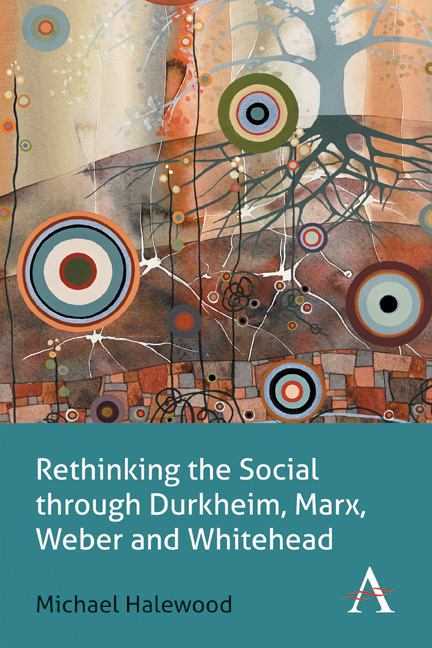Book contents
- Frontmatter
- CONTENTS
- Acknowledgements
- List of Abbreviations
- Chapter One Rethinking the Social
- Chapter Two Durkheim Approaches the Social
- Chapter Three Durkheim's Philosophy of the Social
- Chapter Four Marx on the Social and the Societal
- Chapter Five Weber's “Sozial” Action
- Chapter Six The Early Death of the Problem of the Social
- Chapter Seven Toward a Philosophy of the Social – Part One: Durkheim, Marx, Weber (and Simmel) Revisited
- Chapter Eight Toward a Philosophy of the Social – Part Two: Whitehead on Sociology, Societies and the Social
- Notes
- References
- Index
Chapter Two - Durkheim Approaches the Social
Published online by Cambridge University Press: 05 December 2015
- Frontmatter
- CONTENTS
- Acknowledgements
- List of Abbreviations
- Chapter One Rethinking the Social
- Chapter Two Durkheim Approaches the Social
- Chapter Three Durkheim's Philosophy of the Social
- Chapter Four Marx on the Social and the Societal
- Chapter Five Weber's “Sozial” Action
- Chapter Six The Early Death of the Problem of the Social
- Chapter Seven Toward a Philosophy of the Social – Part One: Durkheim, Marx, Weber (and Simmel) Revisited
- Chapter Eight Toward a Philosophy of the Social – Part Two: Whitehead on Sociology, Societies and the Social
- Notes
- References
- Index
Summary
Introduction
To ask the question – “What does Durkheim mean by the social” – is to miss the point. To my knowledge, in his four major texts, Durkheim only uses the phrase “the social” once, very late on in his last full work, The Elementary Forms of the Religious Life (EFRL). In English translations of his work, however, the phrase “the social” is used liberally, for example: “the social environment” (DL, 285); “the social domain” (RSM, 83); “the social element of suicide” (S, 52); “the social order” (EFRL, 369). This is because Durkheim uses the word “social” as an adjective which comes after the noun in French, for example: “le milieu social” (DD, 340); “le règne social” (Règles, 46); “l'élément social du suicide” (LeS, 16); “l'ordre social” (FÉ, 527). This prevalence of the word “social” in the English translations is compounded by the addition of the word when it was not there in the French. For example, in The Rules of Sociological Method: “classe” becomes “social class” and “l'eloignement” becomes “social distance” (both in RSM, 51), while “organisation” becomes “social organisation” (RSM, 52). The image of “the social” and what Durkheim means by “social” is not as obvious or as ubiquitous as it is in English, and we should certainly be wary of expecting Durkheim to give an account of a phrase that he uses only once.
This is not simply a problem of translation, for this possible confusion over Durkheim's concept of the social is exacerbated by the surprising fact that he never defines exactly what he means by either “social” or “society”. Nevertheless, Durkheim clearly did mean something when using these words, even if he did not make his thinking explicit. The bulk of this chapter, and the next, will be taken up with a reconstruction of his implicit arguments by rereading his major texts. The aim is not to establish whether Durkheim was right or wrong on these matters, but to outline the role of the concepts “social” and “society” in his work. This will, in turn, set the parameters for the readings and analyses to be developed in later chapters.
- Type
- Chapter
- Information
- Publisher: Anthem PressPrint publication year: 2014

